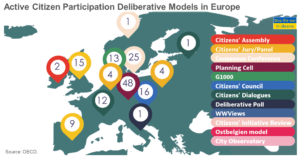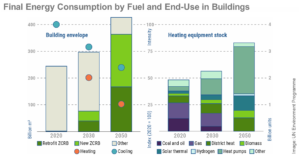Holum, Marthe. "Citizen Participation: Linking Government Efforts, Actual Participation, and Trust in Local Politicians". International Journal of Public Administration. March 13, 2022. https://www.tandfonline.com/...
 Citizen participation is key for effective and successful local government. Without participation, local government initiatives have a limited effect on improving trust in local politics and politicians, resulting in much more challenging policy implementation. Without the effective involvement of citizens in local government decision-making, participation is mainly protest-related. Citizen participation in government policy-making and implementation is considered essential for true democracy. Participation is the way for the government to understand the needs of the public and for the public to monitor governmental operations. Rather than meetings or public hearings, low-threshold web-based initiatives appear to be the most effective participation mechanism.
Citizen participation is key for effective and successful local government. Without participation, local government initiatives have a limited effect on improving trust in local politics and politicians, resulting in much more challenging policy implementation. Without the effective involvement of citizens in local government decision-making, participation is mainly protest-related. Citizen participation in government policy-making and implementation is considered essential for true democracy. Participation is the way for the government to understand the needs of the public and for the public to monitor governmental operations. Rather than meetings or public hearings, low-threshold web-based initiatives appear to be the most effective participation mechanism.
Posted on 17/03/22
Recent Abstracts

Level(s)
Level(s) specifies technical screening criteria for investments in the built environment that support the EU’s objective to reduce the whole-life carbon impact of new buildings. It is part of the Sustainable Finance and EU Taxonomy package that defines activities that contribute significantly to climate change mitigat ...
Posted on 04/11/21

Why It’s Time to Get Serious About Embodied Energy
Embodied energy is the energy consumed by all processes associated with the production of a product – from the mining and processing of natural resources to the manufacturing, transport and delivery of the finished product. It is the energy consumed in the extraction of materials and production of the products used to ...
Posted on 03/11/21

WWF and Greenview Collaborate with Hotel Industry to Develop a Methodology to Measure Waste across Hotel Chains
The Hotel Waste Measurement Methodology provides a common approach for the hotel industry to collect data, and measure and report food waste. The measurement methodology allows major brands and individual properties to set meaningful goals to reduce food waste, keep food out of landfills, and track progress over time ...
Posted on 02/11/21

Gaseous Emissions from the Combustion of Biomass Pellets
Biomass is considered a sustainable energy source with significant potentials for replacing fossil fuels and electricity for heating purposes. However, present residential wood combustion can be a significant source of ambient urban air pollutants such as hydrocarbons and particulate matter. The majority of the wood- ...
Posted on 31/10/21
COP26 Climate Summit: A Scientists’ Guide to a Momentous Meeting
During COP26 – the 26th UN Climate Change Conference of the Parties – government officials and business leaders will present their latest commitments to cut greenhouse-gas emissions. Scientists will also discuss efforts to track emissions, understand impacts, and advance potential climate solutions. With its traditio ...
Posted on 28/10/21

Why the Building Sector?
To meet 1.5° climate targets of the Paris Agreement by 2040, we must eliminate all CO2 emissions from the building sector. Why the built environment? Buildings generate nearly 40% of annual global GHG emissions. Of emissions, building operations are annually responsible for 28% while building materials and construct ...
Posted on 28/10/21

UN Climate Change Conference (COP26)
COP26 is the 26th United Nations annual climate change "Conference of Parties" (COP) to build awareness and stimulate dialog on climate action and participation. The United Nations Framework Convention on Climate Change (UNFCCC) is among the largest international meetings of governments, the private sector and civil s ...
Posted on 20/10/21
Architecture “One of the Least Well-Represented Businesses” in Race to Zero
Architects and designers are failing to engage with the UN's drive to reduce carbon emissions. None of the 50 largest architects signed up to the UN’s Race to Zero campaign, which is the UN initiative to get companies to commit to achieving net-zero emissions by 2050. Architects and designers are in a unique position ...
Posted on 19/10/21
Level(s) – European Framework for Sustainable Buildings
Level(s) is a simple entry point for applying circular economy principles in our built environment and a flexible solution for identifying sustainability hotspots and for future-proofing projects and portfolio. It provides a common language for assessing and reporting on the sustainability performance of buildings. Lev ...
Posted on 22/07/21

Sustainable Construction Investment, Real Estate Development, and COVID-19: A Review of Literature in the Field
Studies show that consumption by buildings attributable to real estate development around the world is 30-40% per year. As much as 50% of minerals from natural resources is consumed by the construction industry. Real estate development produces around 33% of atmospheric CO2 while construction and building operations ...
Posted on 22/07/21
Effects of Densification on Urban Microclimate—A Case Study for the City of Vienna
The impacts of climate change are especially tangible in dense urban areas due to the inherent characteristics of urban structure and materiality. As the climate change impacts are intensifying, climate adaptation, mitigation and protecting strategies are becoming even more important. To assess the impacts of climate ...
Posted on 15/06/21
Environmental Defenders and Their Recognition Under International and Regional Law – An Introduction
This is an introduction to the efforts of environmental defenders to protect and conserve the ecological integrity of the ecosystems of their communities. The fulfillment of the international community’s commitment to the protection of the environment is premised on the empowerment of environmental defenders. Environ ...
Posted on 15/05/21
Creative Legal Strategies
The Center for Constitutional Rights (CCR) discusses the creative use of law as a positive force for social change and developing a distinctive set of tools and strategies. It suggests employing justice-enabling constitutional principles, applying underutilized rules and rulings, using litigation to move actors out of ...
Posted on 15/05/21
How Do Legal Strategies Advance Social Accountability? Evaluating Mechanisms in Colombia
This theory-building paper argues that there are four mechanisms by which legal strategies can enhance accountability. The courts can help those affected by policy failures to overcome the collective action problem. The courts can provide civil society with access to information about rights violations, malfeasance, ...
Posted on 15/05/21
Marriott in Danger of Losing 122 Hotels to Much Smaller Brand
Service Properties Trust (SVC) sent Marriott a payment shortfall notice on 122 hotels, allowing Marriott 10 days to pay the $11m delinquency. If Marriott fails to make payment, SVC will terminate the agreement and transfer the hotels to flag affiliation with Sonesta International Hotels Corp., of which SVC owns 34%. Th ...
Posted on 24/03/21

